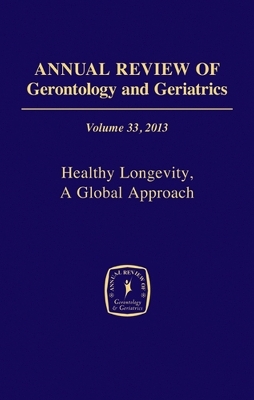
Annual Review of Gerontology and Geriatrics, Volume 33, 2013
Springer Publishing Co Inc (Verlag)
978-0-8261-0994-1 (ISBN)
- Titel z.Zt. nicht lieferbar
- Versandkostenfrei innerhalb Deutschlands
- Auch auf Rechnung
- Verfügbarkeit in der Filiale vor Ort prüfen
- Artikel merken
The book addresses ongoing demo-epidemiological changes regarding longevity, estimates of oldest-old populations, and prevalence of chronic and degenerative diseases, frailty, and old-age dependency. The meaning of healthy longevity as a theoretical concept is explored. Grounded in the fundamental issue of whether or not the prevalence of poor health or poor quality of life inevitably increases with age, recent research and ongoing studies from a variety of perspectives are presented from several nations. The book clarifies the known and hypothetical factors favoring healthy longevity, from genes to social integration. Additionally, chapters explore gender differences in age trajectories and changes over time. Special attention is given to the social and cognitive dimensions of healthy longevity.
Key Features:
Disseminates new scholarly research about a rapidly growing segment of the population-the oldest old
Offers multidisciplinary and international perspectives about the factors that promote healthy survival and improve quality of life
Addresses the social and cognitive dimensions of healthy longevity
Provides important information regarding health care costs for this population
Includes the research of seasoned and emerging scholars
Jean-Marie Robine, PhD, is a Research Director at the French National Institute of Health and Medical Research and head of the Health and Demography team at the Department of Biostatistics, University of Montpellier, France. Since its creation in 1989, Dr. Robine has been the coordinator of the International Network on Health Expectancy (REVES), which brings together over 150 researchers from more than 100 research institutes or universities in over 30 countries worldwide. He is the project leader of the European Health Expectancy Monitoring Unit (EHEMU), supported by the European Union. He is also responsible for the development of the International Database on Longevity (IDL) in association with the main research demographic centers. In the field of the genetic of longevity, Dr. Robine was one of the principal investigators of the European challenge for Healthy Ageing project (ECHA, Fifth European Research Framework, 2001-2004) and was one of the PI's for the Genetic of Healthy Ageing project (GEHA, Sixth European Research Framework, 2004-2009). Dr. Robine is also the chair of the Committee on Longevity and Health of the International Union for the Scientific Study of the Population (IUSSP) and co-chair of the Steering Committee of the World Ageing Survey (WAS), prepared by the International Association of Gerontology (IAG). ||Carol Jagger, PhD, is the AXA Professor of Epidemiology of Ageing in the Institute for Ageing and Health, Newcastle University. Her research spans demography and epidemiology with a focus on mental and physical functioning in ageing and determinants of healthy active life expectancy, particularly through cohort studies of ageing: the Melton Mowbray studies and currently the MRC Cognitive Function and Ageing Study and the MRC Newcastle 85 study. Within Europe she co-leads the European Health Expectancy Monitoring Unit and led the Healthy Ageing and Wellbeing theme of the FUTURAGE project which has created the roadmap for ageing research in Europe for the next 10-15 years. Carol is a Chartered Scientist and a Fellow of the Faculty of Public Health. |Eileen Crimmins, PhD, is the AARP Professor of Gerontology at the University of Southern California where she is currently the director of the USC/UCLA Center on Biodemography and Population Health, one of the Demography of Aging Centers supported by the U.S. National Institute on Aging. She is also the Director of a Multidisciplinary Training in Gerontology grant. Dr. Crimmins is a co-investigator of the NIA Sponsored Health and Retirement Survey in the U.S. Much of her research has focused on changes over time in health and mortality. Crimmins has been instrumental in organizing and promoting the recent integration of the measurement of biological indicators in large population surveys. She recently served as co-chair of a Committee for the National Academy of Sciences to address why life expectancy in the U.S. is falling so far behind that of other countries. She is a member of the Committee on Population at the National Research Council and has served on NAS panels of Race/Ethnic differences in Health, the Challenges of an Aging Society, and The Health of the American Population. She has co-edited several books with a focus on international aging, mortality and health expectancy: Determining Health Expectancies; Longer Life and Healthy Aging; Human Longevity, Individual Life Duration, and the Growth of the Oldest-old Population; the Handbook of Adult Mortality, Explaining Diverging Levels of Longevity in High-Income Countries, and International Differences in Mortality at Older Ages: Dimensions and Sources.
Preface
Jean-Marie Robine, Carol Jagger and Eileen Crimmins
Section 1: How healthy are the longest lived?
Chapter 1. The oldest-old: Health in Europe and the United States
Aïda Solé-Auró and Eileen M. Crimmins
Chapter 2.
Age Trajectory of High Cognitive Functioning Among the Oldest Old
Mikael Thinggaard, Matt McGue and Kaare Christensen
Chapter 3. Malleability of human ageing: the curious case of old age mortality in Japan
Frouke M. Engelaer, Eugene M.G. Milne, David van Bodegom, Yasuhiko Saito, Rudi G.J. Westendorp and Thomas B.L. Kirkwood
Chapter 4. Quality of health care: approaches and findings from the English Longitudinal Study of Ageing
Nicholas Steel, David Melzer and Suzanne Richards
Chapter 5. The semantic network of ageing well
Rocio Fernandez-Ballesteros, Maria-Angeles Molina, Rocio Schettini and Marta Santacreu
Chapter 6. A New Concept of Successful Aging in the Oldest-old. – Development of gerotranscendence and its influence on the psychological well-being –
Yasuyuki Gondo, Takeshi Nakagawa and Yukie Masui
Section 2: What drives healthy longevity?
Chapter 7. Optimizing Human Healthspan and Lifespan: Insights from Okinawa and Hawaii
Bradley J. Willcox, Makoto Suzuki, Timothy A. Donlon, Qimei He, John S. Grove, Kamal H. Masaki and D. Craig Willcox
Chapter 8. Mobility in human aging: A multidisciplinary lifespan conceptual framework
Luigi Ferrucci and Jack M. Guralnik
Chapter 9. Physical and Biological Indicators of Health and Functioning in U.S. Oldest-Old
Jennifer Ailshire and Eileen Crimmins
Chapter 10. Extended Fixed Attribute Dynamics Method and an Illustrative Application in Bio-demographic-genetic Analysis on Longevity
Zeng Yi
Chapter 11. Gene expression biomarkers and longevity
David Melzer, Luke C Pilling, Alexander D Fellows, Alice C Holly, Lorna W Harries and Luigi Ferrucci
Section 3: Are we living longer healthier?
Chapter 12. Understanding the mortality decline at older ages: improved life course or improved present period?
Dorly Deeg, Majogé J.G. van Vliet, Jan W.P.F. Kardaun and Martijn Huisman
Chapter 13. Recent trends in disability-free life expectancy in the French elderly: Twenty years follow-up of the Paquid cohort
Karine Pérès, Arlette Edjolo, Jean-François Dartigues and Pascale Barberger-Gateau
Chapter 14. Trends of functioning and health in nonagenarians - the Vitality 90+ Study
Marja Jylha, Linda Enroth and Tiina Luukkaala
Chapter 15. Trends over time in cognitive function and activities of daily living among Danish centenarians
Karen Andersen-Ranberg
Chapter 16. Sex differences in healthy life expectancy in the Netherlands
Frouke M. Engelaer, David van Bodegom and Rudi G.J. Westendorp
Conclusion
Jean-Marie Robine, Carol Jagger and Eileen Crimmins
| Reihe/Serie | Annual Review of Gerontology and Geriatrics |
|---|---|
| Verlagsort | New York |
| Sprache | englisch |
| Gewicht | 690 g |
| Themenwelt | Geisteswissenschaften ► Psychologie ► Entwicklungspsychologie |
| Medizin / Pharmazie ► Medizinische Fachgebiete ► Geriatrie | |
| Studium ► Querschnittsbereiche ► Prävention / Gesundheitsförderung | |
| Sozialwissenschaften ► Pädagogik ► Sozialpädagogik | |
| Sozialwissenschaften ► Soziologie | |
| ISBN-10 | 0-8261-0994-2 / 0826109942 |
| ISBN-13 | 978-0-8261-0994-1 / 9780826109941 |
| Zustand | Neuware |
| Haben Sie eine Frage zum Produkt? |
aus dem Bereich


